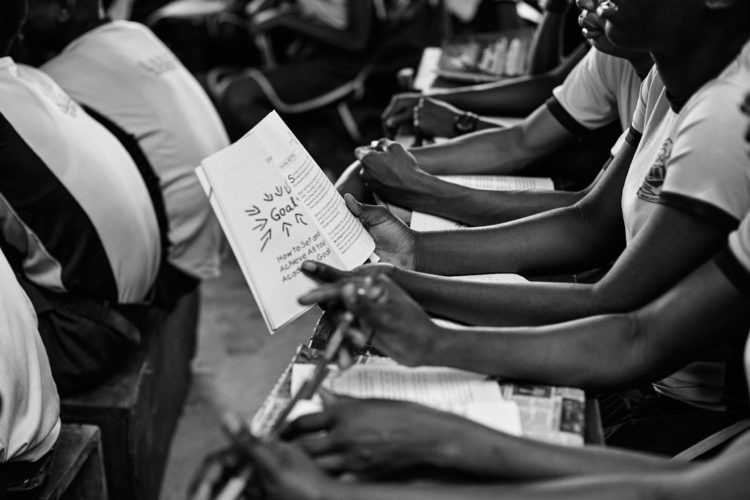Millions of lives could be improved by tackling global tax abuse

New research led by the University of St Andrews reveals that millions of lives around the world could be improved by tackling global tax abuse.
The new report, led by the Global Child Health team at the University’s School of Medicine, reveals that 36 million additional people would access basic sanitation, 18 million more people could access clean drinking water, and almost seven million more children would attend school if Western governments cracked down on tax abuse.
In addition, over a decade, this extra revenue would be associated with preventing the deaths of 600,000 children and around 80,000 mothers across the globe.
The Global Child Health team, working alongside colleagues from the Universities of Leicester and Warwick, have shown that if there were an increase in revenue equivalent to losses from tax abuse, there would be significant progress towards the United Nations’ Sustainable Development Goals (SDGs).
The research, published in PLOS Global Public Health this week (Tuesday February 22) quantified the potential for progress towards the SDGs by modelling the impact of an increase in government revenue equivalent to the estimated tax abuses in each country.
The Government Revenue and Development Estimations (GRADE) project is a collaboration between the University of St Andrews and the University of Leicester, led by Dr Bernadette O’Hare, a Senior Lecturer in Global Child Health, and Professor Stephen Hall, an applied econometrician. The GRADE project models the relationship between government revenue and progress towards the SDGs. The model is used to quantify the potential of curtailing tax abuse but has also been used to quantify the contribution of large corporations to public finances in different countries.
Dr O’Hare said: “The SDGs are grounded in international human rights, and we studied SDG 3, 4 and 6 for this paper (health, education, water and sanitation) as they are critical determinants of child health and survival. Governments generally provide these as public services, and when governments have more revenue, they spend more on health determinants. However, low and lower-middle-income countries have minimal government revenue per person. Therefore, plugging preventable leaks such as tax abuse (avoidance and evasion) would have a huge impact.”
The Tax Justice Network reports four countries (Luxembourg, the Netherlands, Switzerland, the UK and its Overseas Territories and Crown Dependencies) create the vulnerabilities responsible for more than half of global tax abuses.
Professor Hall explained: “The GRADE modelling takes a country’s governance into account when modelling the impact of revenue progress towards the SDGs. However, as an increase in government revenue also improves the quality of governance over time, it is vital to curb preventable leaks such as tax abuses, particularly as a small number of countries contribute to a large proportion of these. Therefore, focussing on increasing revenue by curtailing leaks will allow countries to develop effective governance and accelerate progress towards the SDG targets by 2030.”
Dr O’Hare added: “There is hope for child rights and progress towards the SDGs. The Global Legal Action Network, Oxfam, Christian Aid, Action Aid and others used GRADE estimates to illustrate the impact of Irish tax policies on children’s rights overseas in their submission to the United Nations Committee on the Rights of the Child (UNCRC). The UNCRC asked Ireland to explain how it ensures its tax policies do not undermine children’s rights overseas.
“This month, the UNCRC has requested the Netherlands to assess their tax and financial policies to ensure they do not contribute to tax abuse that negatively impacts resources for children’s rights in the countries their companies work. We hope the UNCRC will call on all countries known to create the vulnerabilities that enable tax abuse to carry out similar assessments, and GRADE could usefully contribute to these.”
The GRADE project paper, Tax abuse - the potential for the Sustainable Development Goals, was written by Dr Bernadette O’Hare, Dr Marisol Lopez, Dr Stuart Murray and Dr Chris Torrie of the School of Medicine at the University of St Andrews; Bernadetta Mazimbe, PhD student at Sheffield Hallam University (formerly the Ministry of Agriculture, Lilongwe, Malawi); Professor Nicholas Spencer, Warwick Medical School, University of Warwick; and Professor Stephen Hall, School of Business, University of Leicester. It is published by PLOS Global Public Health and available online.
Please ensure that the paper’s DOI link [doi:10.1371/journal.pgph.0000119] is included in all online stories and social media posts, and that PLOS Global Public Health is credited as the source.
The project was funded by the Scottish Research Council, the Global Challenges Research Fund, and the Professor Sonia Buist Global Child Health Research Fund.